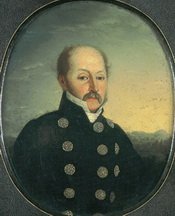(1772-1844)
Sándor Kisfaludy was a Hungarian poet and officer in the Imperial Austrian Army, and can be considered the founder of Hungarian Romanticism. Inspired by Petrarch, he invented the so-called “Himfy strophe”. His chief work was Himfy's Loves, a volume which combined 1801's Mournful Love and, dating from a few years later, Happy Love. The most popular book of its time, it is viewed with somewhat less enthusiasm today. His writing Diary and My Captivity in France is valuable historical documents of their time.
Born in Sümeg to a landed noble family, Kisfaludy started out his career as a student of law before joining the military. He served with the Imperial Army in Vienna and took part in the war against Napoleon in Milan before being captured by the French. Upon his release, he was stationed at the barracks in Württemberg and eventually, after the 1799 Battle of Zurich, left the army to return home and launch his literary career.
It was through a gift from Kisfaludy that his younger brother, Károly Kisfaludy, was able to launch the periodical Aurora in 1822. In 1828, Sándor Kisfaludy took part in drafting the by-laws of the Hungarian Academy of Sciences, becoming a regular member of its department of languages and liberal arts in 1830. He had a permanent theatre built in Balatonfüred and also served as a judge in several counties. In 1842, he was accepted as a member of the Kisfaludy Society established in memory of his brother.
Married twice, he was widowed both times. His first wife, as well as his muse, was Róza Szegedy, with whom he settled in Sümeg.
Sándor Kisfaludy was a Hungarian poet and officer in the Imperial Austrian Army, and can be considered the founder of Hungarian Romanticism. Inspired by Petrarch, he invented the so-called “Himfy strophe”. His chief work was Himfy's Loves, a volume which combined 1801's Mournful Love and, dating from a few years later, Happy Love. The most popular book of its time, it is viewed with somewhat less enthusiasm today. His writing Diary and My Captivity in France is valuable historical documents of their time.
Born in Sümeg to a landed noble family, Kisfaludy started out his career as a student of law before joining the military. He served with the Imperial Army in Vienna and took part in the war against Napoleon in Milan before being captured by the French. Upon his release, he was stationed at the barracks in Württemberg and eventually, after the 1799 Battle of Zurich, left the army to return home and launch his literary career.
It was through a gift from Kisfaludy that his younger brother, Károly Kisfaludy, was able to launch the periodical Aurora in 1822. In 1828, Sándor Kisfaludy took part in drafting the by-laws of the Hungarian Academy of Sciences, becoming a regular member of its department of languages and liberal arts in 1830. He had a permanent theatre built in Balatonfüred and also served as a judge in several counties. In 1842, he was accepted as a member of the Kisfaludy Society established in memory of his brother.
Married twice, he was widowed both times. His first wife, as well as his muse, was Róza Szegedy, with whom he settled in Sümeg.
